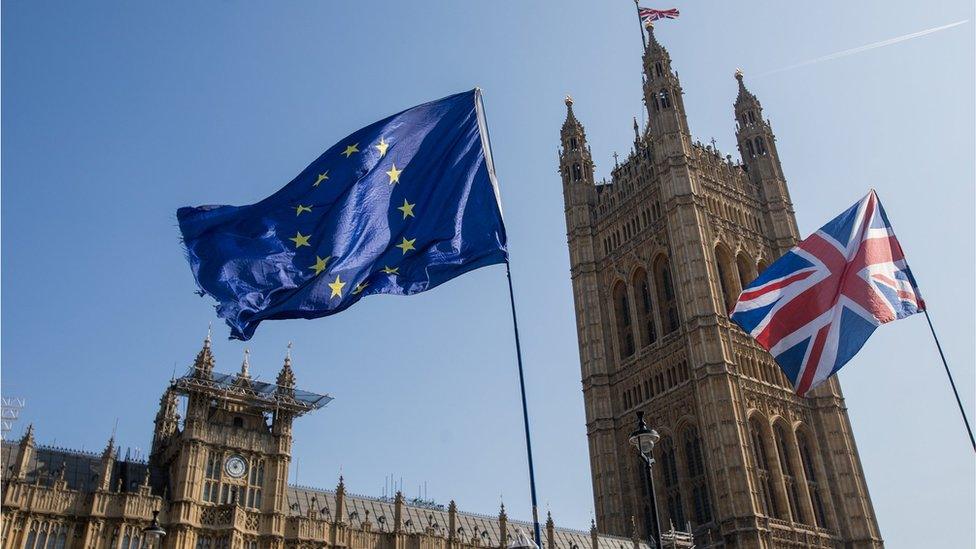Why has the government changed its mind over EU law plans?
- Published

The government has abandoned its plans for thousands of EU-era laws to expire automatically.
The laws, which were agreed by the UK when it was a member of the bloc, remained in place after Brexit but were supposed to be repealed or reformed by the end of 2023.
What was the government's plan?
When the UK left the EU in 2020, EU laws that had applied in the UK before this date were kept in place to "maintain legal continuity and certainty".
However, one of the major arguments put forward by Brexit supporters was that leaving the EU would mean the UK could write its own laws.
The government therefore agreed to review thousands of these EU-era laws by the end of 2023.
To do that, it introduced the Retained EU Law (REUL) Bill to "amend, repeal or replace REUL that does not work for the UK".
Which laws were affected?
Under the bill, EU laws would no longer apply in the UK from the start of 2024, with the exception of:
laws that the government decided it wanted to keep, either in their current form or with changes
laws that the government decided to retain until a later deadline of 23 June 2026
laws relating to financial regulation which would be covered by separate legislation
The government had identified, external more than 4,800 individual pieces of retained EU law.
These cover things like working time and equal pay, food labelling and environmental standards.
EU laws would be changed through secondary legislation - a fast-track process for making laws that receives less scrutiny from MPs than normal.
During his Conservative party leadership campaign in August 2022, Rishi Sunak pledged to begin "review[ing] every EU law on our statute book" within his first 100 days of office, in a video that showed EU laws being shredded, external.
Allow X content?
This article contains content provided by X. We ask for your permission before anything is loaded, as they may be using cookies and other technologies. You may want to read X’s cookie policy, external and privacy policy, external before accepting. To view this content choose ‘accept and continue’.
What has changed?
In a big change of policy, the government has now decided that instead of the legislation expiring automatically, ministers will come up with a list of 600 specific laws which they want to replace by the end of the year.
Defending the move, Business Secretary Kemi Badenoch told MPs the government was still "ending EU supremacy", but just "changing how we are doing it".
She told the Telegraph that the end-of-year deadline had meant civil servants were concentrating on which laws should be retained "rather than pursuing the meaningful reform government and businesses want to see".
Why was the government's plan to scrap legislation controversial?
With so much legislation to consider in a relatively short period of time, there were concerns that neither the relevant Whitehall departments - nor the governments in Scotland, Wales and Northern Ireland - would have enough time to review all the laws properly.
Former Conservative Northern Ireland Secretary and Brexit supporter Theresa Villiers acknowledged it would be "very difficult" to finish the job by the end of 2023. She told the Financial Times that, "inevitably when you have 50 years of regulation, it's going to take time to carry out this exercise".
Critics also argued the bill gave too much power to ministers to make widespread legal changes with little or no Parliamentary scrutiny.
A number of business groups and unions also warned that the bill could endanger important rights, highlighting EU laws on safe working hours, holiday pay and protection from discrimination.
Environmental law charity Climate Earth said it was "almost inevitable" that some of the laws that guarantee environmental protection could "inadvertently fall victim" to the December 2023 deadline.
In a statement announcing the bill, external in September 2022, the government insisted it would keep "high standards in areas such as workers' rights and the environment", and that the bill would give "the UK the opportunity to be bolder and go further than the EU in these areas".
Conservative MP Jacob Rees-Mogg, who championed the deadline when he was business secretary, has criticised the prime minister for breaking his word, arguing that the deadline had been a good way "to make Whitehall [civil servants] work".